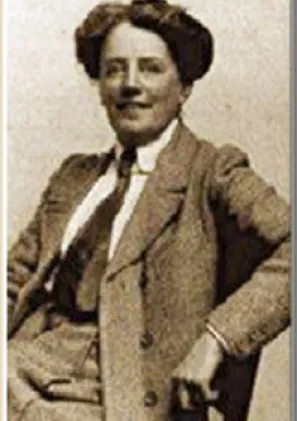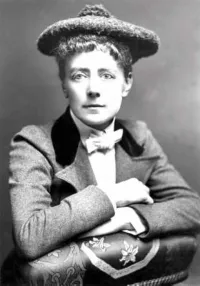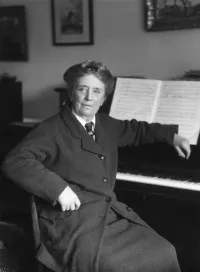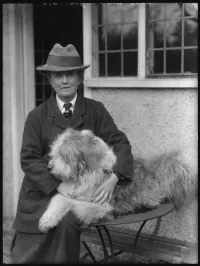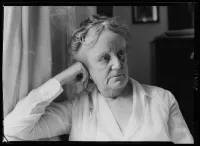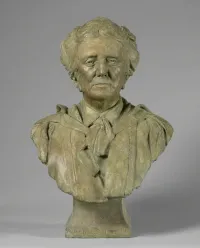Biography
1858 - 1944
“I feel I must fight for [my music], because I want women to turn their minds to big and difficult jobs; not just to go on hugging the shore, afraid to put out to sea.”
– Ethel Mary Smyth
Though her family felt her music studies were making her “unsuitably intense,” Ethel Smyth refused to give up her dream and was eventually allowed to attend the prestigious Leipzig Conservatory of Music. In 1890 she made her debut in England with ‘Serenade in D’ and gained further recognition with ‘Mass in D.’ Her work includes chamber pieces, symphonies, choral works, and several operas including ‘The Wreckers’ (1902). In 1903 ‘Der Wald’ became the first and only opera written by a woman to be performed at the New York Metropolitan Opera. In 1910 Smyth met dynamic suffragette Emmeline Parkhurst who headed the Women’s Social and Political Union. A smitten Smyth pledged to give up music for two years in devotion to the cause, but not before composing ‘The March of the Women’ which became the battle cry of the suffrage movement. After smashing the windows of political foes, Smyth and fellow women’s rights activists were sentenced to 2 months in jail. Refusing to be broken, Smyth conducted a prison yard performance of ‘The March of the Women’ from her cell window with a toothbrush. A boisterous sportswoman in tweeds – Smyth published several memoirs (Female Pipings for Eden, What Happened Next, etc) in which she frankly but discreetly speaks of her love of women. In 1922 she was made a Dame Commander of the Order of the British Empire. At 71 she fell in love with the 47 year-old Virginia Woolf. In later years advancing hearing loss ended Smyth’s music career. She died in 1944 in Woking, England at the age of 86.
1858 - 1944
“I feel I must fight for [my music], because I want women to turn their minds to big and difficult jobs; not just to go on hugging the shore, afraid to put out to sea.”
– Ethel Mary Smyth
Though her family felt her music studies were making her “unsuitably intense,” Ethel Smyth refused to give up her dream and was eventually allowed to attend the prestigious Leipzig Conservatory of Music. In 1890 she made her debut in England with ‘Serenade in D’ and gained further recognition with ‘Mass in D.’ Her work includes chamber pieces, symphonies, choral works, and several operas including ‘The Wreckers’ (1902). In 1903 ‘Der Wald’ became the first and only opera written by a woman to be performed at the New York Metropolitan Opera. In 1910 Smyth met dynamic suffragette Emmeline Parkhurst who headed the Women’s Social and Political Union. A smitten Smyth pledged to give up music for two years in devotion to the cause, but not before composing ‘The March of the Women’ which became the battle cry of the suffrage movement. After smashing the windows of political foes, Smyth and fellow women’s rights activists were sentenced to 2 months in jail. Refusing to be broken, Smyth conducted a prison yard performance of ‘The March of the Women’ from her cell window with a toothbrush. A boisterous sportswoman in tweeds – Smyth published several memoirs (Female Pipings for Eden, What Happened Next, etc) in which she frankly but discreetly speaks of her love of women. In 1922 she was made a Dame Commander of the Order of the British Empire. At 71 she fell in love with the 47 year-old Virginia Woolf. In later years advancing hearing loss ended Smyth’s music career. She died in 1944 in Woking, England at the age of 86.
Demography
Demography
Gender Female
Sexual Orientation Lesbian
Gender Identity Cisgender
Ethnicity Caucasian/White
Nations Affiliated United Kingdom
Era/Epoch First-wave Feminism (1848-1930) Interwar Period (1918-1939) Progressive Era (1890-1920) Victorian Era (1837-1901)
Field(s) of Contribution
Music
Social Justice
Commemorations & Honors
Oxford Honorary Doctorate
Universities of Durham Honorary Doctorate
Judy Chicago's Feminist Art Piece The Dinner Party Place Setting for Smyth
Made a Dame Commander of the Order of the British Empire (1922)
Demography
Gender Female
Sexual Orientation Lesbian
Gender Identity Cisgender
Ethnicity Caucasian/White
Nations Affiliated United Kingdom
Era/Epoch First-wave Feminism (1848-1930) Interwar Period (1918-1939) Progressive Era (1890-1920) Victorian Era (1837-1901)
Field(s) of Contribution
Music
Social Justice
Commemorations & Honors
Oxford Honorary Doctorate
Universities of Durham Honorary Doctorate
Judy Chicago's Feminist Art Piece The Dinner Party Place Setting for Smyth
Made a Dame Commander of the Order of the British Empire (1922)
Resources
Resources
Collis, Rose. Portraits to the Wall: Historic Lesbian Lives Unveiled. London: Cassell, 1994.
Crichton, Ronald, ed. The Memoirs of Ethyl Smyth (abridged). London: Viking, 1987.
Wood, Elizabeth. "Sapphonics." Queering the Pitch: The New Gay and Lesbian Musicology. Philip Brett, Elizabeth Wood, and Gary Thomas, eds. New York: Routledge, 1994. 27-66.
https://en.wikipedia.org/wiki/Ethel_Smyth
https://www.exploringsurreyspast.org.uk/themes/people/musicians/dame_ethel_smyth/
https://www.theguardian.com/uk/2000/jun/11/vanessathorpe.theobserver
https://www.encyclopedia.com/women/encyclopedias-almanacs-transcripts-and-maps/smyth-ethel-1858-1944
Resources
Collis, Rose. Portraits to the Wall: Historic Lesbian Lives Unveiled. London: Cassell, 1994.
Crichton, Ronald, ed. The Memoirs of Ethyl Smyth (abridged). London: Viking, 1987.
Wood, Elizabeth. "Sapphonics." Queering the Pitch: The New Gay and Lesbian Musicology. Philip Brett, Elizabeth Wood, and Gary Thomas, eds. New York: Routledge, 1994. 27-66.
https://en.wikipedia.org/wiki/Ethel_Smyth
https://www.exploringsurreyspast.org.uk/themes/people/musicians/dame_ethel_smyth/
https://www.theguardian.com/uk/2000/jun/11/vanessathorpe.theobserver
https://www.encyclopedia.com/women/encyclopedias-almanacs-transcripts-and-maps/smyth-ethel-1858-1944
